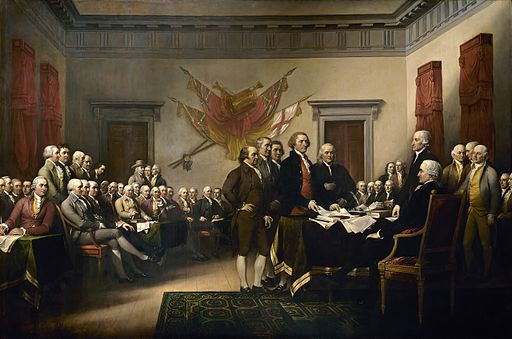What Did America’s Founding Fathers Believe About God and the Bible?
Written by Jedd Cole
 Does America’s respect for the founding fathers cloud what these influential men believed about religion? Does it discount the real founding Father?
Does America’s respect for the founding fathers cloud what these influential men believed about religion? Does it discount the real founding Father?
Critics of America’s current moral decline often point to the founding fathers as examples of freedom, pure politics and religious conservatism.
But looking at their own writings, it’s easy to see a reflection of Enlightenment ideas that pick and choose what to believe about God and the Bible based on empiricism and human reason.
So, if the revered founding fathers had wrong beliefs, does this mean we should question the all-important hand God played in bringing the United States its rich blessings and world power?
Let’s take a look at a few of the most famous founding fathers.
Benjamin Franklin
Benjamin Franklin has left many legacies for modern Americans as a prolific writer, inventor, statesman and philanthropist. On religion, Franklin made his beliefs very clear in a letter to his friend Ezra Stiles.
Franklin outlined his religion in a way similar to many other Deists of the time, which included belief in:
- One God, the Creator.
- The importance of good works toward others (ethics).
- The immortal soul (George Perkins and Barbara Perkins, The American Tradition in Literature, 2008, p. 331).
While Franklin agreed with Jesus Christ’s teachings on behavior, he dwelt firmly in the Deist camp regarding Jesus’ divine conception and relation to God the Father. It seemed to him a doubtful notion, and he concluded: “I see no harm, however, in its being believed, if that belief has the good consequence, as it probably has, of making [Jesus’] doctrines more respected and better observed; especially as I do not perceive that the Supreme takes it amiss” (ibid.).
To better understand where Franklin was coming from, let’s look at the writing of his compatriot Thomas Jefferson.
Thomas Jefferson
As the principal drafter of the Declaration of Independence and third president of the United States, Jefferson enjoys a privileged spot in the American mythos. Of all the founding fathers, he is today regarded as a quintessential Enlightenment-era thinker.
As such, his religious beliefs mirrored Franklin’s. In a letter to Benjamin Rush, Jefferson listed a series of comparisons in what he calls an “Estimate of the Merit of the Doctrines of Jesus, Compared With Those of Others.” He agreed in passing that the ethics of Jesus Christ’s teachings, under perfect conditions, “would be the most perfect and sublime that has ever been taught by man” (ibid., p. 384, emphasis added).
However, beyond these systems of “morals,” Jefferson dismissed Christ’s doctrines, arguing that because He was uneducated and did not write anything Himself, the Bible is merely secondhand and cannot be trusted as absolute. The Bible, to the contrary, makes the claim that it is inspired by God and contains absolute truth. See our article “How Do We Know the Bible is True?” for more information on how you can prove the Bible is the inspired Word of God.
These “reasoned” beliefs can be further defined by another founding father, Thomas Paine.
Thomas Paine
Author of the famous pamphlet “Common Sense,” published prior to the outbreak of the Revolution, and subsequent essays touting the principles of libertarianism and the American cause, Paine also reflected the Deism shared by the intelligentsia of his day.
Paine wrote a book about it called The Age of Reason. Rejecting organized religion as a universally misguided and hypocritical institution, he confidently stated, “My own mind is my own church” (ibid., p. 351). Like Jefferson, he regarded all claims to the divine inspiration of Scripture as hearsay and therefore concluded the Bible shouldn’t be subject to unconditional belief.
He, like the others, applied this to the Messiah: “Jesus Christ wrote no account of himself, of his birth, parentage, or anything else. … The history of him is altogether the work of other people.” From this position, Paine held up the disciple Thomas (who would not believe Christ was resurrected without empirical proof) as the ideal critic of any allegedly divine Scripture (ibid., p. 354).
The real founding Father
So, were the founding fathers a group of anti-religion atheists? No!
They believed in freedom and in doing good. But just like all human beings, they were fallible and subject to the ideologies of the time. Because of this inherent contradiction, it is important not to forget who the real founding Father is.
God warns His people about the pitfall of ascribing blessings to men: “Beware that you do not forget the LORD your God … lest—when you have eaten and are full … and all that you have is multiplied … —then you say in your heart, ‘My power and the might of my hand have gained me this wealth’” (Deuteronomy 8:11-17). As our article “Who Are the United States and Britain in Prophecy?” explains, the blessings that the United States received came directly from God.
After all, God does not want us to look to people for our ultimate examples, but to Jesus Christ. He has given us access to the knowledge of who the Son of God really is, His plan of salvation and America’s place in prophecy—vital truths that even great men like Franklin, Jefferson and Paine did not understand.
To learn more about how our view of the Bible should differ from the founders, read “Is the Bible True?”
Jedd Cole writes short stories and blogs while finishing his degree in rhetoric and professional writing at University of Cincinnati. He attends the Cincinnati/Dayton, Ohio, congregation of the Church of God, a Worldwide Association.










